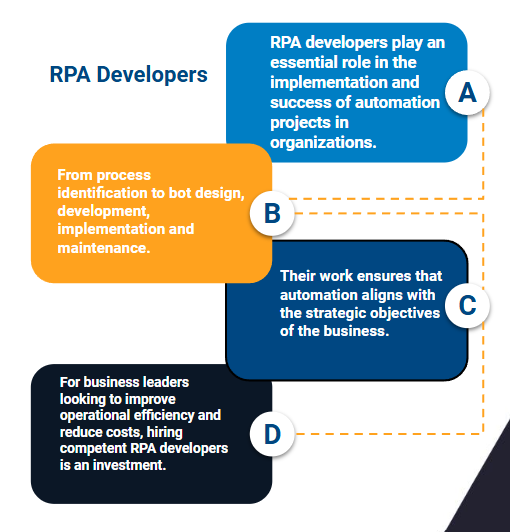
Implementing RPA through outsourcing companies: advantages and benefits
September 11, 2024
Table of contents
Quick Access

Robotic process automation, better known as RPA, has become one of the most disruptive technologies in the business field. By allowing the automation of repetitive and manual tasks, RPA offers a significant improvement in efficiency, accuracy, and reduction of operating costs.
However, many companies that consider adopting this technology often face key questions: Is it profitable to implement RPA? Is it feasible to do so through an outsourcing company?

What is RPA and why is it crucial for companies?
RPA consists of the use of software or "bots" to automate repetitive and rule-based tasks within business processes. These tasks are usually of low added value, such as data entry, form validation, and invoice processing, among others. Using RPA frees employees from these tedious responsibilities, allowing them to focus on more strategic and creative activities.
Companies that adopt RPA experience improved operational efficiency, reduced human error, and cost savings. According to a Deloitte study, 53% of organizations have already begun their RPA implementation and 78% of these expect to increase their use of this technology in the next three years.
Is it beneficial to implement RPA through an outsourcing company?
The short answer is: yes. Implementing RPA through an outsourcing company has multiple advantages, especially for companies that do not have the infrastructure or specialized team necessary to develop the technology internally. Here are some of the main benefits.
1. Access to specialized experts
The implementation of RPA is not a simple process. It requires advanced technical knowledge in programming, process analysis, and organizational change management. By hiring an outsourcing company specializing in RPA, you benefit from the knowledge and experience of a team of professionals who have worked on multiple similar projects. This reduces the learning curve and speeds up the implementation process.
In addition, these companies are aware of the latest technological trends and best practices in RPA, ensuring that your project is optimized from the start.
2. Reduction of initial costs and risks
Implementing RPA internally can be expensive, as it requires significant investments in infrastructure, staff training, and software licenses. With an outsourcing company, you can outsource much of these costs, paying only for the necessary services and often under a pay-per-use scheme. This results in a much more flexible and accessible model, especially for small or medium-sized companies.
On the other hand, outsourcing companies usually have a well-defined work structure and experience in risk management, which minimizes the likelihood of something going wrong during the project.
3. Scalability and Flexibility
One of the biggest benefits of opting for an RPA outsourcing company is the ability to scale the project based on business needs. Instead of investing in additional staff and technology, you can scale up or down the scope of the project as required, allowing you to adapt to changes in market demand without complications.
Outsourcing companies also offer flexibility in terms of technology. Having experience with multiple RPA software vendors (such as UiPath, Automation Anywhere, or Blue Prism), they can recommend the solution that best fits your company's needs and budget.
4. Focus on the core business
RPA outsourcing allows companies to focus on what really matters: their core business. Leaving the implementation and management of automation in the hands of external experts ensures that internal teams can focus on developing products, serving customers, and improving user experience without diverting resources to technical projects.
5. Faster and more efficient implementation
Hiring an outsourcing company speeds up the implementation process. By having a dedicated team and proven methodology, these companies can launch an RPA project much faster than if it were done internally. This not only ensures that the company starts seeing the benefits in less time, but also minimizes the impact on productivity during the transition process.

How to implement RPA through an outsourcing company?
The process for implementing RPA through an outsourcing company generally follows the following steps:
1. Process assessment and analysis
The outsourcing company begins by conducting a detailed analysis of the organization's processes to identify the best opportunities for automation. This involves mapping current workflows, identifying bottlenecks, and assessing which repetitive and rule-based tasks can be effectively automated.
2. Design and development
Once the right processes have been identified, the outsourcing company designs the customized RPA solution for your business. This includes selecting the right technology, designing the bots, and programming the workflows.
3. Testing and optimization
Before launching automation at the enterprise level, extensive testing is performed to ensure that the bots work correctly and that the results meet the expected objectives. This step is crucial to avoid errors and ensure a smooth transition.
4. Implementation and ongoing support
Finally, RPA bots are implemented into the company's processes. The outsourcing team also offers ongoing support to optimize performance, resolve technical issues, and scale automation as needed.
Implementing RPA through an outsourcing company is a highly efficient strategy for companies looking to automate processes without facing the complications of developing an in-house solution. This option not only allows for cost and time savings, but also guarantees access to subject matter experts, flexibility, and a significant reduction in risks.
If your company is considering process automation, RPA through an outsourcing company can be the perfect solution to optimize your operation and stay competitive in today's market.
We recommend you on video
Related Blogs

Steps for software product development
-9.20.37-a.m.png)
Product Design and Development

Tools for Machine Learning

The Best Data Science Tools in 2025

What is Data Science?
